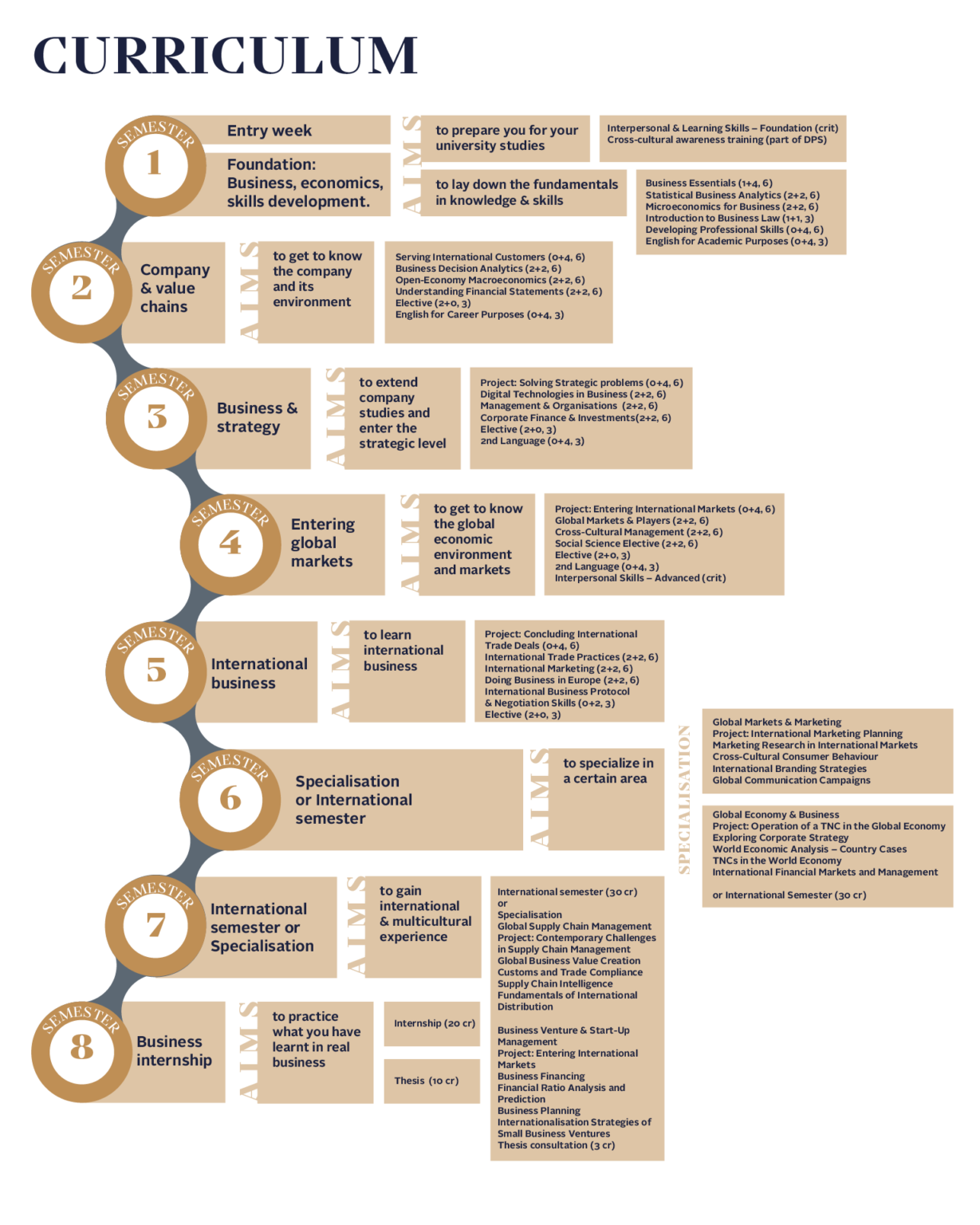MSc in Marketing
for current students
Upcoming Deadlines/Events

Year 1
- Specialization : XY date
- Exam period : XY date

Year 2
- Specialization : XY date
- Exam period : XY date

Year 3
- Specialization : XY date
- Exam period : XY date

Year 4
- Specialization : XY date
- Exam period : XY date
News

News 1

News 2

News 3

Based on the conversations with employers (marketing and sales managers in multinational and national companies), firms prefer to employ students, who
• have founded marketing knowledge
• are able to process and interpret customer and market data
• have strong analytical skills
• can prioritize and can work in line with the strategic goals
• can draw conclusions from analysis to support marketing decisions
• have strong sales skills in B2B positions
• have excellent and up-to-date presentation skills,
• are able to think in concepts (not platforms and tools), respectively, in brand management
• have a problem-solving attitude and a project approach
• have very good written and oral communication skills
• speak English at a very high level
• be able to apply digital technologies in business
• work effectively in a multicultural environment
Employers’ expectations and our responsibility to prepare you for marketing career determine the aims of the programme, which are as follows:
The objective of the Marketing MSc programme is the training of marketing experts who perform marketing activities in various business and non-business organizations, institutions, and enterprises.
Detailed aims are to train marketing experts who:
- they are capable of developing a marketing strategy,
- managing various marketing activities and projects in various organizations, processes, and professional programmes,
- defining the content of the necessary marketing tools, coordinating the execution of tasks,
- communicating with internal and external functions and organizations,
- capable of communicating in written and oral forms, and modern info-communication tools in two foreign languages.
- They are prepared to continue their studies in post-graduate programs (i.e., MBA or PhD programmes).
The curriculum will help you and us reach the Marketing MSc programme’s objectives, which have the following characteristics. You have to complete eight quarters (7-week terms), of which the last two quarters provide you with an opportunity to specialize in a contemporary marketing problem.
The quarter terms build on one another, and there are tight relations between courses of the curriculum. You will apply knowledge and skills gained in core courses in upcoming marketing courses. Several courses are unique and not available at other domestic universities. The curriculum is designed to address international labor market needs for marketing professionals.
The logic of your studies is as follows:
The intensive week offers you courses to improve your soft skills, including design communication, identity management, intercultural communication, and sustainability and ethical management.
Quarter 1-4
In Quarters 1 – 4, you have the opportunity to attend core business and marketing courses and lay down the fundamentals to work as a marketing professional in a corporate environment. These courses provide the necessary knowledge and skills for upcoming marketing courses.
Quarter 5-6
These quarters offer courses that help you to go deeper into major fields of marketing, like marketing innovation, sales management, advanced research methods, services marketing, and branding. These courses prepare you for coping with the most important marketing strategy decisions. In addition, you will start to work on your thesis work with the help of a supervisor.
Quarter 7 – 8
During this period, you shall specialize in a contemporary marketing field, such as online marketing communication, innovative channel management, or data-driven marketing. These quarters enable you to develop expertise in a particular area that supports your career goals. You will close your studies by finishing and submitting the master’s thesis work.
A module consists of 3 courses on a contemporary marketing field. You will have three options to choose from: Online Marketing Communication, Innovative Channel Management, and Data-driven Marketing. For details, see the modules (click here).
During the Marketing Master’s, you will encounter various teaching methods that help you acquire the knowledge and skills for your career expectations. The programme uses the following teaching methods:
Lectures
Lectures typically aim to build, explain, and discuss theoretical knowledge in the class that completes your readings. Most lectures are 90-minute events, but many professors hold interactive lectures that require your active participation. In the case of large courses, lectures are held online, or you are asked to watch a video (or more).
The role of lectures varies and is not restricted to frontal presentations of professors. Often your existing knowledge will be organized, you will be thinking together, different views will be contrasted, etc. Lectures are events that prepare you for seminars and develop your professional skills.
Frequently, you are required to prepare for a lecture, e.g., read book chapters, academic or business articles, or watch a video. In such cases, the lecture will be built on the assumption that you have prepared and possess the relevant knowledge and skills acquired from your previous preparation.
Though lectures are not compulsory, the knowledge and the information are relevant to your overall course performance. Moreover, seminars often build on the information shared in the lectures, so make sure to participate in lectures.
Seminars
Seminars are events where you focus on applying theoretical knowledge discussed in the lecture and prepared at home. Seminars might include class discussions, individual or team exercises, and presentations. You might have to prepare assignments before the seminars discussed during the class, whereby you will receive feedback from your tutor and fellow students. Thus, seminars are highly effective in learning the competencies and skills you need for your future career. Please note that participation in seminars is compulsory.
Lectures and seminars are mainly built on problem-based, research-based learning methods and project works.
Problem-based learning (PBL) is an effective learning methodology in which you study a subject through the experience of solving an open-ended problem. By working on a business or marketing problem and its solution, you will learn concepts, principles, and facts and how to apply them. In addition, problem-based learning promotes the development of critical thinking skills, using creative problem-solving, communication skills, and enhanced group collaboration.
Research-based learning (RBL) is a learning methodology in which you actively gather information from multiple resources, materials, and texts to explore important, relevant, and interesting questions and challenges. In the case of RBL, you have to collect, process, structure, and evaluate information and ideas as you build reading skills and vocabulary. You learn how to read for understanding, interpretations, develop and evaluate hypotheses, and think critically.
Projects comprise a series of tasks that need to be completed to reach a specific outcome. You will be working on several projects during your studies. Projects will teach you to apply and combine knowledge and skills learned during the courses. Furthermore, you will have to complete a business project course in your chosen module.
Outside-class learning
A large part of your learning will take place outside the classrooms. This might mean studying at home on your own or working in team at the university, in a library, at Starbucks, or anywhere else.
Frequently, you will be asked to read something, watch videos or a pre-recorded lecture, conduct research, prepare project works, and case study assignments for the classes. You will be working on your individual assignments and team projects outside of class.
Outside-class learning requires substantial time and effort, thus, taking responsibility for your own learning process.
Soft skills
Soft skills are non-technical skills that include how you interact with colleagues, solve problems, and manage your work. Soft skills consist of interpersonal skills, common sense, personality, emotional intelligence, and attitude toward people. They are essential for succeeding in the workplace, impacting how you perform and interact with your co-workers. Soft skills include teamwork, presentation, problem-solving, time management, decision-making, critical thinking, and conflict resolution skills. Companies emphasize increasingly soft skills of their employees.
In your Marketing Masters programme, we emphasize developing your soft skills by providing an opportunity for teamwork, working on real marketing problems, preparing peer reviews, and managing and implementing research and business projects. These tools will develop your written and oral communication skills, critical thinking, analytical and digital skills, or learning data visualization. Furthermore, we provide intensive-week courses like Design Communication, Identity Design and Creative Management, Intercultural Communication, and Sustainable and Ethical Marketing that allow for developing your creativity, design thinking skills, and cross-cultural communication skills and increasing your sensitivity to sustainable marketing activities.
Modules
Modules allow you to deepen your knowledge and develop your practical skills in a specific marketing area. In Quarter 7, we offer three modules: Online Marketing Communication, Innovative Channel Management, and Data-driven Marketing.
Online Marketing Communication
When: 7-8th Quarters
Lead by: Dr Ákos Varga
Institute: Institute of Marketing and Communication Sciences
The Online Marketing Communication module provides comprehensive knowledge of on how online and digital marketing communications activities can be planned and implemented, how to plan, develop, implement, disseminate, and manage compelling, relevant, valuable, and coherent content (messages, stories, ideas, propositions) in various formats (textual, visual, audio, audio-visual) through different channels to attract and engage well-defined target audiences to respond to well-defined objectives and drive well-defined results. In the 7th Quarter, students learn Digital Marketing Communication Strategies and Content Marketing followed by the Online Marketing Communication Business Project course in the 8th Quarter. The curriculum facilitates cooperation among students and teachers and develops the necessary skills of teamwork, presentation, time management, and accurate working.
• Digital Marketing Communication Strategy
• Content Marketing
• Online Marketing Communication Business Project
See the above description of the application process.

Innovative Channel Management
When: 7-8th Quarters
Lead by: Dr Irma Agárdi
Institute: Institute of Marketing and Communication Sciences
The Innovative Channel Management module provides comprehensive knowledge of the concept and influence factors of retail customer experience. Students get familiar with the omnichannel nature of retail shopping and service interfaces of retailing (i.e., interactions with sales personnel, in-store, online, and mobile technologies, and store environment), and constituents of the retail brand. Furthermore, students learn how trade innovations are created and what impact they have on the theoretical foundations of distribution systems (power, conflict, conflict resolution and distribution planning). Students will learn the measurement foundations of trade distribution and practice and develop new measures due to digitalization.
In the 7th Quarter, students learn Retail Experience and Channel Design followed by the Innovative Channel Business Project course in the 8th Quarter. The curriculum facilitates cooperation among students and teachers and develops the necessary skills of teamwork, presentation, time management, and accurate working.
• Retail Experience
• Channel Design
• Innovative Channel Business Project
See the above description of the application process.
Data-driven Marketing
When: 7-8th Quarters
Lead by: Dr Ildikó Kemény
Institute: Institute of Marketing and Communication Sciences
The Data-driven Marketing module provides knowledge of basic data science concepts and advanced analytical methods, applying big data in marketing decision-making, and combining transactional and survey data to model customer behaviour. In addition, you will be able to assess non-monetary and monetary customer value, use customer databases to develop marketing and sales strategies, design and measure CRM campaigns, and coordinate marketing channels to maximize customer value generated for the company.
In the 7th Quarter, students learn Advanced Research Methods for Data-Driven Marketing Decisions, Customer Relationship Management, and Data-driven Marketing Business Project course in the 8th Quarter. The curriculum facilitates cooperation among students and teachers and develops the necessary skills of teamwork, presentation, time management, and accurate working.
• Advanced Research Methods for Data-driven Marketing Decisions
• Customer Relationship Management
• Data-driven Marketing Business Project
See the above description of the application process.
Application process
The application process for modules is based on students’ preferences, their study performance, and the results of an assessment center.
First step
You can set your preferences for the module you would like to complete.
Second Step
After setting the preferences, the study performance will be calculated based on the grades of all previously completed courses. 15% of students with the highest study performance (average grade of the previous courses) can choose the most preferred module.
Third Step
Students will participate at an assessment center to solve a complex problem related to each module. They will be assigned to one of the modules based on their initial preferences and performance in the assessment center.
Please note that we cannot guarantee that you will get into the most preferred module (capacities cannot be adjusted to fluctuating interest toward a module).
International Opportunities
Lorem ipsum dolor sit amet, consectetur adipiscing elit. Ut elit tellus, luctus nec ullamcorper mattis, pulvinar dapibus leo.
Erasmus+ programme is one of the most successful and recognized programs of the European Commission, in the frame of which Corvinus students (with the exception of the Stipendium Hungaricum scholarship students) may take part in a one or two-semester study and/or internship mobility. The program – in addition to achieving professional goals of part-time study abroad – will also help you to improve your language skills, reinforce your communication skills, and assist you in building out a network of international friends. You can find more information on Erasmus (how to apply, funding, etc.) if you click on the link below.
Freemover
If you are interested in going to a university with which Corvinus does not have a bilateral exchange agreement (i.e., universities not included in the list of Corvinus partner institutions), you can still apply to the given university as a freemover. Moreover, if you have applied to a partner university in the frame of the Partial Studies Application, but are not chosen, you can still contact the given university to ask if they could host you as a freemover student. You can find more details if you click on the link below.
Double-degree programs lead to the award of joint diplomas offered in cooperation with prestige higher education institutions. Marketing MSc students can participate in double-degree programs with the CEMS network, KEDGE Business School, Passau University, and Catholica Porto Business School.
- For information about the CEMS double-degree program, please click on the link.
- In the double-degree program with KEDGE Business School, Corvinus students will study Quarters 1 – 6 at Corvinus and Quarters 7-8 at Kedge BS. Students will be awarded a double degree upon successfully completing the programme. Corvinus University issues a Marketing MSc diploma, KEDGE Business School Marketing MSc, or Global Management, depending on the chosen specialization at KEDGE.
- Students who successfully applied for the double-degree program with Universität Passau will accomplish their studies in Quarters 1-4 at Corvinus University, Quarters 5-8 in Passau. Please note that participants have to choose the data-driven module. Corvinus University will award a degree in Marketing MSc, and Universität Passau a master’s degree in Business Administration.
- In the Universidade Catolica Portuguese double-degree program, students complete Quarters 1-2 and 7-8 at Corvinus, Quarters 3-6 at Catholica Porto. Participants can earn a Marketing MSC diploma from Corvinus University and Management MSc from Catholica Porto.
Thesis
You must prepare and submit a thesis work at the end of your studies. The diploma thesis is a “masterpiece” work in which you demonstrate that you have acquired the knowledge and skills of your studies and can analyze a topic or a problem. The thesis work aims to certify the student’s knowledge and expertise in a chosen research problem. Students conduct a thorough literature review, build research concept and methodology, implement the research and analyze the collected information, interpret the results, and convert the findings into academic and business implications. Your work will be supported by the courses Thesis Consulting in the last three quarters. High-level research methodology courses and your thesis supervisor support the thesis writing. For further information please read the Thesis guide.
Thesis guide
Thesis submission
There are milestones in the process of writing your thesis. You will be asked to submit your topic and the name of your supervisor, thesis outline, theoretical chapter, and a 90% complete thesis. 10 days at the latest before the submission deadline of final thesis you should upload the finished thesis on Moodle and send it to your supervisor for a final check. You will need the formal approval of your supervisor to be able to submit your thesis. For details and deadlines, please read the current Thesis guide.
You can upload your finished thesis work for a text similarity check. It will automatically run through the Urkund text similarity checker software. The aim of this exercise is to phase out (unintentional) plagiarism. You can repeat the upload as many times as you wish.
Please note that Urkund only examines the degree of text similarity, not directly the fact of plagiarism. The result of the text similarity check is only indicative, it aims to warn you that parts of your essay resemble or is identical to other texts.
Please note that Urkund only examines the degree of text similarity, not directly the fact of plagiarism. The result of the text similarity check is only indicative, it aims to warn you that parts of your essay resemble or is identical to other texts.
Ask for your supervisor’s approval for the final submission. You can do it by pressing the Studies → Degree thesis/Thesis application → Thesis admission request button in Neptun. If your supervisor approves the request, you can submit your thesis.
You must upload your thesis and an executive summary on Neptun, under Studies → Degree thesis/Thesis application → Upload Degree thesis. Go through the following steps:
• Press the Upload Degree thesis button.
• Fill in the final title of your thesis.
• Make declarations about own work and parallel programs.
• Upload your thesis and choose the level of publicity.
• Upload the executive summary.
• Click on the Save files button to finish the process
Please note that you must apply for your final exam; submitting your thesis is not enough. You must apply for final exam separately in Neptun under Administration → Final examination.
Important deadlines
Final exam
The major aim and the role of the Final Exam is to assess the extent to which you have mastered the knowledge and skills included in the Marketing MSc program. The final exam consists of the defense of the thesis and the complex exam.
Your Final Exam will have two parts:
1. Thesis defence
2. Comprehensive exam
In the thesis defence part, you will be asked to:
- Present your thesis in a maximum of 10 minutes. Please focus on explaining the research problem, the relevance of your topic, your research concept and methodology, research findings, and their implications.
- React to the comments and critiques of your opponents.
- Answer the question received from the final exam committee.
- The Committee may ask questions during or after the presentation.
The Committee evaluates the final exam based on the presentation, response to the opponents’ reviews, and the answer to the committee question.
The comprehensive exam will assess your knowledge and competencies gained in the program. Areas of knowledge include four compulsory subjects: Consumer Behavior, Advanced Marketing Research, Integrated Marketing Communications, and Marketing Strategy. Your competencies will be assessed based on the following:
- Recognition of the practical relevance,
- Knowledge of theoretical concepts,
- Ability to argue with theoretical concepts,
- Formulation of original recommendations.
FAQ
Submit the thesis and the executive summary in two separates .pdf files.
Filename for thesis: NAME_NEPTUNCODE_thesis_programme_year
example: SMITHJOHN_A1B2C3_thesis_IB_2022.
Filename for executive summary: NAME_NEPTUNCODE_summary_programme_year
example: SMITHJOHN_A1B2C3_summary_IB_2022.
Useful information
To make your life easier we have collected some frequently searched link that we hope you find useful. If you click on the buttons, you will be transferred to the relevant part of the university website. We hope you will enjoy this function.
To whom shall I turn to..
First check the website. When we created this website to include all the information you need during your studies in one place. So, before you send an email, please check the relevant part of the website to see if you can find an answer to your question. Trust me this is the fastest way! 😊 Don’t forget to check the FAQ.
If you are still looking for an answer after checking the website, contact us here:
- Curriculum-related question -> irma.agardi@uni-corvinus.hu
- General thesis-related question -> irma.agardi@uni-corvinus.hu
- Final examination-related question -> irma.agardi@uni-corvinus.hu
- Specific thesis-related questions: your thesis supervisor
- Erasmus-related question -> DoItOnline Erasmus section
- Double-degree programs-> erika.komjathy@uni-corvinus.hu
- Finance-related question -> DoItonline Finance section
- Neptun issue -> DoItOnline
- Requests -> DoItOnline
- General study-related question -> DoItOnline
- Administrative problem(s) related to courses -> Departments
Note: You can find a more detailed contact list if you click on the ’Important Contacts’ button.
FAQ
You can download it from your Neptun (Administration/general forms). Set the page to 100 items. The documents are already signed and stamped.
Print it and bring it to the Students’ Area and a student coordinator will sign and stamp it for you.
Come to the Students’ Area and a student coordinator will insert this sentence into your certificate, then print, sign, and stamp it for you / request it via Doitonline and a student coordinator will prepare and scan it for you.
Sorry, Neptun does not see the future and is not programmed to issue documents for the future. However, on your student status certificate there is information about the expected and of your legal status with Corvinus.
You can get it in the Students’ Area (bring an ID and your NEK sheet. The real documents, not just photos of them).
No, because civil authorities and BKK do not accept scanned temporary student IDs, only the original ones.
As this card is made by the government, not by the single universities, first you need to go to a government office and register for a student ID.
The government office gives you a paper called NEK sheet (do not lose it, you will need it later for years). You must enter its code in the top right had corner into your Neptun (Administration / Student Card request).
The governmental Education Office will make a card for you and when it is ready, they will send it to the Student Office for you.
In the meantime, you can get a temporary student ID in the Students’ Area.
First inform Student Services about the lost card (Doitonline or in person in the Student Area) so that they can set the status of your student ID to “lost” in Neptun. Then you do the same steps as with your first card: go to the government office etc.
That is probably because many requests are only available before their deadlines. These are usually communicated via Neptun messages. Please always read your Neptun messages.
You need to contact the department which is in charge of that subject. Only the department administrators can open up more places. This is not a matter for the Student Office.
On this webpage under ‘Important Contacts’
contact the Erasmus office: corvinus.erasmus@uni-corvinus.hu
contact the financial office: osztondij@uni-corvinus.hu
contact the internship office: bce.szakmaigyakorlat@uni-corvinus.hu
contact the Neptun team via Do it online
If it is banking data, you must do it for yourself (Neptun/Finances/Settings). For all other document updates you can EITHER go to the Students Area personally with your document and a student coordinator will insert your new data into Neptun OR you can send clear pictures of the relevant pages of your documents via Doitonline and a student coordinator will insert your new data into Neptun.
You can take the required 120 credits + 10 percent (12 credits) for free. It means that you only have to pay for the credits above 132.
A student may take a maximum of 42 credits per semester.